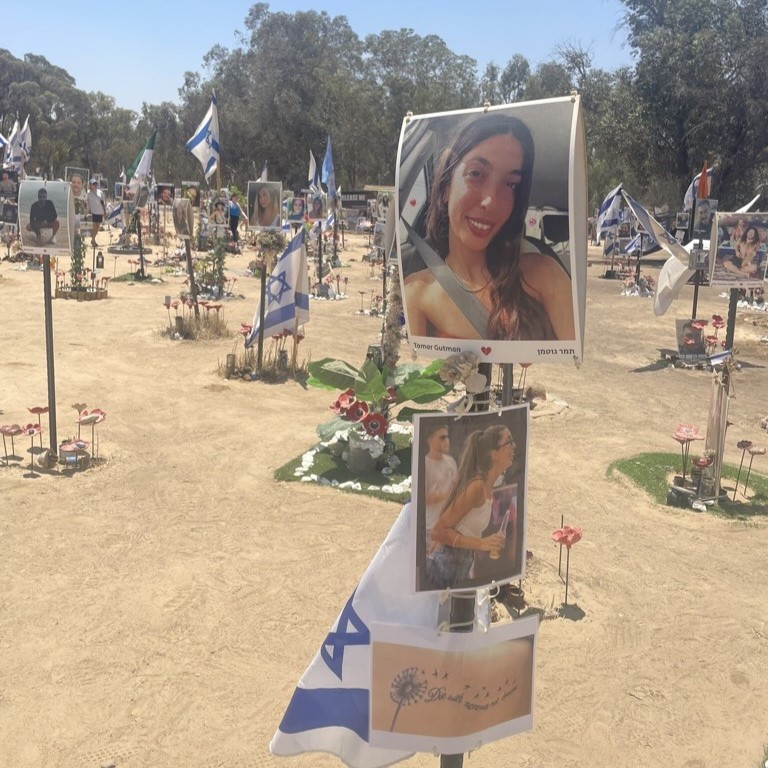Two leaders from the Jewish Federation of Greater Kansas City recently returned from a fundraising, research and development trip to Berlin and Israel.
The trip was put together by the Jewish Federations of North America (JFNA) and was the first of its kind since the Oct. 7 massacre.
The Kansas City Jewish community was represented by Federation President and CEO Jay Lewis and Board Chair-Elect Sondra Friedman, who joined about 60 people from across North America to see the effect of JFNA and local Federations’ money to help Ukrainian refugees in Berlin and Israelis in the wake of Oct. 7.
Lewis said the main reason they went on this trip was to learn. Lewis and Friedman saw firsthand the impact of Federation donations overseas — especially, Lewis said, the $3.6 million investment of the Kansas City Jewish community through the Israel Emergency Campaign.
Friedman and Lewis arrived in Berlin, first seeing the memorials at the main train station commemorating the deportations of Jews to concentration and death camps during the Holocaust.
“[The Germans] do not shy away from their history,” Lewis said. “They own their history. They own their memory — not just the Jewish community, but Germany itself owns that they murdered 6 million Jews across Europe, and many more besides Jews.”
The reason Germany was on the itinerary is that Ukrainian Jewish refugees, fleeing from the war with Russia, are being taken care of in Berlin. There are 13,000 Jewish refugees, and Federation funds go to help them with everything from basic needs to children’s programs and life enrichment.
Lewis and Friedman met with a displaced Ukrainian teenager who intends to go back to Ukraine to finish her senior year of high school.
“I asked her if she was afraid to go back at all,” Lewis said, “and the 17-year-old said to me, ‘I’ll risk a missile or rocket if it means I can be with my friends and in a place that I know.’”
The group then flew to Tel Aviv, where the airport walkways were covered in posters and signs reminding travelers of the hostages that were taken by Hamas on Oct. 7. Lewis said that life seemed “normal” in Tel Aviv, with the exception of the ever-present reminders of the country’s pain for its hostages.
They drove to within half a mile of the Gaza border and visited the ruins of Kibbutz Nir Oz, a community devastated by the Oct. 7 attacks; and the site of the Nova Music Festival, where countless young people were taken or murdered by Hamas. They also visited Soroka Hospital, which saw the brunt of the casualties and medical emergencies in the wake of the attack.
“I was beyond impressed with the resiliency of the Jewish people in Israel, in Ukraine, in Germany,” Lewis said.
Lewis and Friedman underscored that the local Jewish community’s donations through Federation demonstrably and significantly helped those in need during two of the biggest international tragedies to affect the Jewish people in decades.
Friedman quoted a trip member as saying, “The heart cannot feel what the eyes cannot see.” The group met with victims of the tragedies who had lost family members and been injured, including a 23-year-old woman whose fiance was killed in front of her.
“The whole country is a country of PTSD,” Friedman said. “There isn’t somebody that hasn’t been impacted.”
She also said that the dichotomy of the fairly normal conditions of Tel Aviv and the war in Gaza (and bombings in the north) was “hard to rectify,” but “in the end, this is exactly what you want it to be. You want to see this kind of resiliency — it’s the best revenge to people that try to attack Jewish life.”
An editorial by Lewis about the trip is available here.



